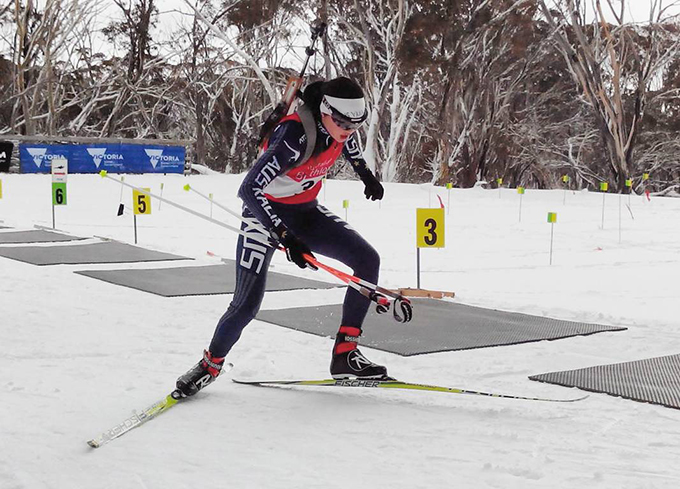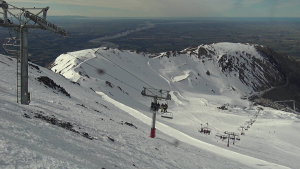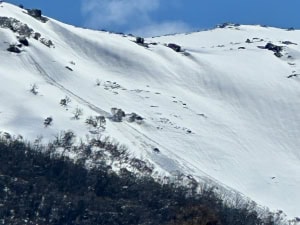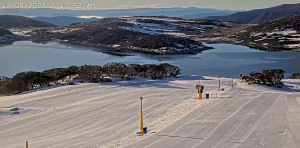Five minutes with Australian Biathlete Jill Colebourn – Interview

An evolution of Scandinavian hunting on skis, biathlon combines the physicality of cross country skiing with the technicality of rifle shooting. Image::Provided
Mountainwatch | Kate Allman
In Australia, if you’ve never heard of biathlon you could be forgiven. However, in Europe biathlon is the most watched winter sport on TV. An evolution of Scandinavian hunting on skis, biathlon combines the physicality of cross country skiing with the technicality of rifle shooting. While no Australian has ever won an Olympic medal in the sport, 21-year-old Sydney University student Jillian Colebourn has set her sights on the 2016 Winter Games. She was the Australian Open Women’s Biathlon Champion at Hotham last year, and has competed for Australia in the Junior World Championships and World University Games. Chloe Esposito won an unexpected gold in Rio for modern pentathlon; so can Australia do the same in biathlon at the upcoming Winter Games? Kate Allman spoke to Jill about her sport to find out.

Biathlon isn’t your average sport here in Australian, but over in Europe it’s the most watched winter sport on television. Image::Provided
Age: 21
Home town: Sydney, Australia
Ski training ground: Hotham, Australia and Livigno, Italy
When did you first start skiing?
I first started downhill skiing as a child with my parents then discovered cross country skiing through school skiing competitions when I was about 12.
What made you decide to try biathlon and when was that?
As a teenager I was a mogul skier for a short time, but when I was 16 I decided to focus on cross country skiing as my primary winter sport. In that same year, I began hearing about biathlon through the cross country community and I was keen to try it out. I had some experience shooting from when I was a scout and could cross country ski, so I figured, why not try biathlon?
Can you explain biathlon to someone who has never heard of it?
Biathlon is a combination of cross country skiing and target shooting. Athletes ski loops of a race track, and at the end of each loop they stop at the shooting range to shoot a rifle at a target. Every time you miss, you must either ski an additional 150 metre loop or have a time penalty added onto your final time – depending on the format of the race. The fastest skier with the most accurate shooting wins.
What is the hardest part of your sport?
Personally, I find the hardest part of the sport is staying extremely focused for the entire race. When you are panting and your heart is racing after the ski loops, it can be very difficult to hold your rifle steady to shoot accurately. Each shot is so important because hitting just one more than your rival could make or break your result. On the ski track I also have to concentrate on constantly pushing my physical limits. It is exhausting.

Jill is one sharp shooter, though she attests to the difficulty when trying to hold the rifle steady after completing each loop of the race track. Image::Provided
What does your weekly training routine look like?
I try to do two training sessions a day, unless I have Uni all day – in which case I’ll just do one. Training includes aerobic exercise such as swimming, which helps to improve the rhythm of my breathing and is very important to maintain accurate shooting. I also focus on a lot of strength work in the gym, as well as roller ski training which mimics cross country skiing techniques. In the Australian winter, my Italian coach travels to Australia and I spend most of my time training and competing in Hotham, which is home to the only biathlon range in Australia. During the Northern Hemisphere winter I’m based in Livigno, my coach’s home town, and I train with the local Italian team.
What are you goals in the near future?
My goal for this year is to compete in some Senior IBU (International Biathlon Union) Cups as well as the World University Games in Kazakhstan. In the long term, I hope to qualify for the World Cup as I would love to compete alongside the highest class of biathletes. As for the Olympics, the qualification process for biathlon is quite complicated since only the top 22 ranked nations receive designated spots for their athletes. Currently Australia is not in ranked in the top 22, however we still have a chance and qualification will depend on our performances in the seasons leading up to February 2016.
When you are 70, where will you be?
Retired, surrounded by my family and hopefully healthy enough to continue travelling the world! Ideally I’d love to live in a ski chalet in the Alps, however more realistically I will probably live in suburbia close to my grandchildren.

Pure grit and determination combined with speed and accuracy is Jill’s recipe for success in Pyeongchang 2018. Image::Provided




